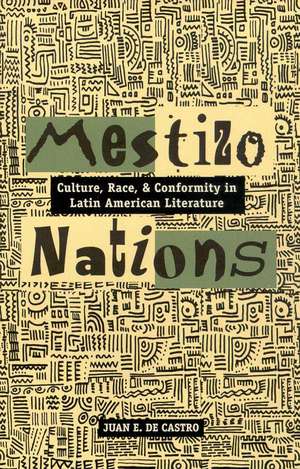Mestizo Nations: Culture, Race, and Conformity in Latin American Literature
Autor Juan E. De Castroen Limba Engleză Hardback – mai 2002
Nationality in Latin America has long been entwined with questions of racial identity. Just as American-born colonial elites grounded their struggle for independence from Spain and Portugal in the history of Amerindian resistance, constructions of nationality were based on the notion of the fusion of populations heterogeneous in culture, race, and language. But this rhetorical celebration of difference was framed by a real-life pressure to assimilate into cultures always defined by Iberian American elites. In Mestizo Nations, Juan De Castro explores the construction of nationality in Latin American and Chicano literature and thought during the nineteenth and twentieth centuries. Focusing on the discourse of mestizaje—which proposes the creation of a homogenous culture out of American Indian, black, and Iberian elements—he examines a selection of texts that represent the entire history and regional landscape of Latin American culture in its Western, indigenous, and neo-African traditions from Independence to the present.
Through them, he delineates some of the ambiguities and contradictions that have beset this discourse. Among texts considered are the Indianist novel Iracema by the nineteenth-century Brazilian author José de Alencar; the Tradiciones peruanas, Peruvian Ricardo Palma's fictionalizations of national difference; and historical and sociological essays by the Peruvian Marxist José Carlos Mariátegui and the Brazilian intellectual Gilberto Freyre. And because questions raised by this discourse are equally relevant to postmodern concerns with national and transnational heterogeneity, De Castro also analyzes such recent examples as the Cuban dance band Los Van Van's use of Afrocentric lyrics; Richard Rodriguez's interpretations of North American reality; and points of contact and divergence between José María Arguedas's novel The Fox from Up Above and the Fox from Down Below and writings of Gloria Anzaldúa and Julia Kristeva.
By updating the concept of mestizaje as a critical tool for analyzing literary text and cultural trends—incorporating not only race, culture, and nationality but also gender, language, and politics—De Castro shows the implications of this Latin American discursive tradition for current critical debates in cultural and area studies. Mestizo Nations contains important insights for all Latin Americanists as a tool for understanding racial relations and cultural hybridization, creating not only an important commentary on Latin America but also a critique of American life in the age of multiculturalism.
Through them, he delineates some of the ambiguities and contradictions that have beset this discourse. Among texts considered are the Indianist novel Iracema by the nineteenth-century Brazilian author José de Alencar; the Tradiciones peruanas, Peruvian Ricardo Palma's fictionalizations of national difference; and historical and sociological essays by the Peruvian Marxist José Carlos Mariátegui and the Brazilian intellectual Gilberto Freyre. And because questions raised by this discourse are equally relevant to postmodern concerns with national and transnational heterogeneity, De Castro also analyzes such recent examples as the Cuban dance band Los Van Van's use of Afrocentric lyrics; Richard Rodriguez's interpretations of North American reality; and points of contact and divergence between José María Arguedas's novel The Fox from Up Above and the Fox from Down Below and writings of Gloria Anzaldúa and Julia Kristeva.
By updating the concept of mestizaje as a critical tool for analyzing literary text and cultural trends—incorporating not only race, culture, and nationality but also gender, language, and politics—De Castro shows the implications of this Latin American discursive tradition for current critical debates in cultural and area studies. Mestizo Nations contains important insights for all Latin Americanists as a tool for understanding racial relations and cultural hybridization, creating not only an important commentary on Latin America but also a critique of American life in the age of multiculturalism.
Preț: 321.78 lei
Preț vechi: 425.07 lei
-24% Nou
Puncte Express: 483
Preț estimativ în valută:
61.60€ • 64.28$ • 51.64£
61.60€ • 64.28$ • 51.64£
Carte indisponibilă temporar
Doresc să fiu notificat când acest titlu va fi disponibil:
Se trimite...
Preluare comenzi: 021 569.72.76
Specificații
ISBN-13: 9780816521920
ISBN-10: 0816521921
Pagini: 161
Dimensiuni: 156 x 235 x 15 mm
Greutate: 0.45 kg
Ediția:New.
Editura: University of Arizona Press
Colecția University of Arizona Press
ISBN-10: 0816521921
Pagini: 161
Dimensiuni: 156 x 235 x 15 mm
Greutate: 0.45 kg
Ediția:New.
Editura: University of Arizona Press
Colecția University of Arizona Press
Notă biografică
Juan E. De Castro is Assistant Professor in Comparative Literature at the Colorado School of Mines.
